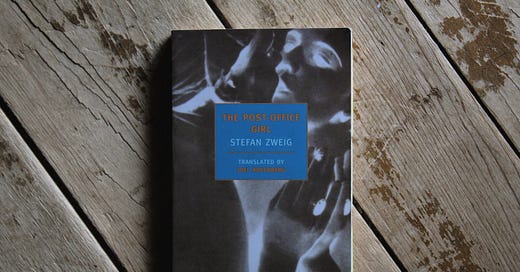The Post-Office Girl by Stefan Zweig
A posthumously published novel by the great Austrian novelist
Published in 1982; Written in the 1930s.
Star Rating: ★★★★★/5
“The vast power of money, mighty when you have it and even mightier when you don’t, with its divine gift of freedom and the demonic fury it unleashes on those forced to do without it— they felt this as never before and were filled with bitter rage when, in the dark of the early morning, they saw the brightly lit windows and knew that those glowing gold curtains gave shelter and freedom to hundreds of thousands of people, men with women they desired, while they themselves were homeless, plodding blindly through the streets, through the rain; it was cruel as only the sea could be cruel— the sea in which a person can die of thirst.”
Stefan Zweig, The Post-Office Girl (pg. 216)
Set in Austria in the year 1926, Zweig’s post-humously published novel is set in the backdrop of post-WWI Austria. From the dissolution of the Austria-Hungary Empire to the lack of employment, life for our lead character Christine Hoflehner is as lifeless as the post office she works at— “Always the same, the same, the same.”
She is underpaid and has never taken time off. Her home is a cramped, impoverished hole that smells of sickness. 28 years old, she must take care of her sick mother and wait; wait for her life to begin, the life that was put on hold by the war. Once young and carefree, she quickly became overwhelmed by her poverty. Living and breathing were too expensive. Everything was too expensive. With her best years slowly drifting away, it feels as though it’s too late to be young. That is until the telegram arrived…
Split into two parts, The Post-Office Girl begins with Christine’s entrance into her aunt’s luxurious lifestyle in a fancy hotel in Switzerland. Overwhelmed by wealth and youth, she discovers something within herself that has never been allowed to come through. Suddenly, she is beautiful, she is young, and she is happy. Dressed in finery and pampered with leisure.
“There, dreaming is better than being awake; here in this celestial world, sleep is a waste of time.”
(pg. 68)
Christine forgets the last ten years of hardship and finally begins to enjoy herself and her existence. She becomes aware that there is more to life than what she has since been exposed to. There is a whole world outside of her small Austrian village- a world of love, music, and comfort. She morphs into a new person, a happier person.
And then… it’s gone.
“Why breathe this in day after day, knowing that there’s another world out there somewhere, the real one, and in herself another person, who is suffocating, being poisoned, in this miasma.”
(pg. 146)
She is back at the post office, back in her little hole with her worn-out clothes and constant worrying- a world where everything is too expensive. Unlike before, Christine has something to miss and yearn for. She is now fully aware of all that she is missing, and this awareness leads her down a path of anger and desperation.
More than ever, She is aware of her poverty and the life she doesn’t have. There is nowhere to go on Sundays, her only day off, except for Vienna. She meets a man named Ferdinand, who has returned after a delayed trip back from his post during the war. Like Christine, he is bitter and angry. The two find solace in one another and attempt to escape their dire situation by whatever means possible.
Zweig is a masterful writer. The story flows dreamily. You are quickly entranced by his gentle narrative style and detailed illustrations. He doesn’t linger unnecessarily; it is quick without missing the less significant points. You feel a great compassion for the heroine’s struggles and an even greater joy at her pleasures. Zweig’s world is rich in both color and misery. The contrast between the high joys of the beginning and the low pains of the ending is brutal in its accuracy. The harsh reality of poverty and the unfeeling commands of capitalism all build up into an overwhelming feeling of hopelessness.
The novel also touches on the effects of war, not only on the economy and public consciousness but also on the individual. Both at home and on the battlefield. It shows the psychological impact of extreme poverty when one is unable to breathe or even know who they are.
“I’m thirty years old, eleven of those years have been wasted. I’m thirty and I still don’t know what it’s all for, I’ve seen nothing but blood and sweat and filth. I’ve done nothing but wait, wait, and wait some more.”
(pg. 192)
I fell in love with Zweig last July after picking up his book Beware of Pity on a whim! I had heard of his Chess novella before but didn’t know much else. I was lucky to have found an NYRB copy for a dollar at my favorite thrift store. The colors of the book and the interesting cover stuck in my mind until I finally decided to take it with me on a plane over to visit my boyfriend in New York. It was my 20th birthday, and I had no idea how that book would transform me. Since then, I was desperate for more Zweig. I found The Post-Office Girl on Thriftbooks for $4.00 and quickly bought it! This second work has cemented Zweig in my own personal hall of fame. Perhaps he is becoming a favorite of mine. I’m hoping the span of time between this read and my third one will be much shorter, preferably in the next month or two.
Thank you for reading, and have a hoppy day!





